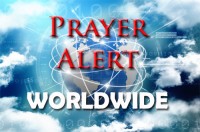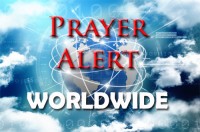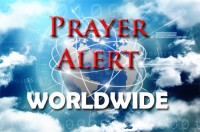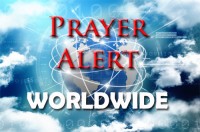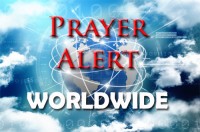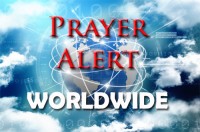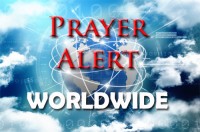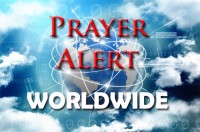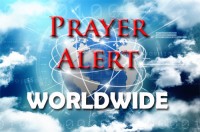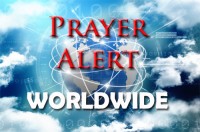Yemen: Christians suffering while Muslims fight
Yemen is the Arab world's poorest country. Life for Christians in Yemen is very hard. All Christians there are from a Muslim background and it is forbidden for Muslims to convert to Christianity. Yemen's constitution provides for religious freedom but it's a farce. Christians are routinely harassed and face daily persecution. It is impossible for any Christian in Yemen to own a Bible. This latest crisis involving Saudi Arabia and Iran will make it worse for Yemeni Christians caught between the ideologies of Shia Iran and Sunni Saudi Arabia, (supported by ten countries). Neither allow the free expression of Christian faith. The Saudis have started bombing Iranian-backed rebels in Yemen. The tension between the two countries has been in the making for years. The leading Sunni power, and the leading Shia power are facing each other for influence in the Middle East and now that proxy fight is playing out in the desert sands of Yemen.
Indonesia: Slavery linked to the fishing industry
Every year, thousands of Cambodian migrants cross the border with Thailand searching for employment and better living conditions. They enter the country without documents after paying unscrupulous traffickers who profit on trafficking with promises of a job. The lack of documents and permits makes them vulnerable and easy victims of forced labour; as happened to more than 300 fishermen who were rescued in Indonesia after being locked in cages or hidden in the forests of the islet of Benjina. They were reduced to slavery, subjected to harassment and abuse and forced to work for Thai-flagged vessels. The Jakarta government discovered the migrant workers following a year-long investigation conducted by Associated Press reporters. The investigation revealed 1,000+ fishermen from Myanmar, Laos and Cambodia trapped on the island at different times, a true international hub of forced labour and of modern slavery linked to the fisheries sector. In February the Catholic Church dedicated a day of prayer to the issue of human trafficking and modern forms of slavery.
Afghanistan: A mission agency request
The tribes of Afghanistan are hearing about Christ as media reach where people can’t physically go. Films, radio, websites, cell phones, SMS messaging, and even Twitter are receiving responses never seen before. As more people hear or watch programmes there is a curiosity that could have taken years to develop by more traditional means. The responses to this new media input are so numerous and significant that the need for effective follow up has grown exponentially and the infrastructure is just not there to handle the needs. What a good problem to have, yet this is still a problem. Infrastructure needs at this time are: - Mother-tongue like-minded speakers who are capable of answering questions as people call in. - High tech and website workers to develop and operate new media vehicles. - Creative minds to develop the next generation of media outreach to spiritually searching people.
Pakistan: ‘Letter from Lahore’ update
Last month you were asked to pray for teams of intercessors to be prepared spiritually as they plan to pray at satanic strongholds from Saturday, 11 April to Monday 13 April. The organiser has asked us to continue to pray about this as there is some fear due to tensions in the country and ‘people should not go unless they are spiritually prepared., We are asked to please pray for God to show each group from each area exactly what He wants them to do. Usually when prayer is planned at a stronghold, a team is sent ahead to prepare the place, not to do spiritual warfare, but just to pray for the team that will come and for God to clear the way for them. That isn´t possible this time. Please pray here for wisdom, clear guidance from the Lord and for spiritual protection.
Nigeria: Historic election outcome
Incumbent Goodluck Jonathan phoned former military leader Muhammadu Buhari on Tuesday to concede defeat in Nigeria's presidential elections, he then followed the phone call with a written statement to his countrymen. Jonathan’s speedy action and words have hopefully prevented violent protests breaking out after calls for calm from the two main candidates and a warning by the United States and Britain against political interference amid earlier claims of vote-rigging and voter intimidation. ‘I promised the country free and fair elections. I have kept my word,’ Mr Jonathan said. A spokesman for Gen Buhari's All Progressives Congress party said, ‘Mr Jonathan will remain a hero for this move. The tension will go down dramatically.’ After a close election there will be many who are unhappy with this outcome but ‘democracy is deepening in Nigeria’ even though the poll has revealed dangerous religious and regional differences - violence still threatens. Further reactions and prayer guidelines available on http://www.Pray4Nigeria.org
American Tribes defend traditional marriage
Months before the US Supreme Court rules on the issue of gay marriage, Native American tribes have taken steps to defend traditional marriage. Eleven tribes with a total membership approaching a million people will not recognize same-sex marriages. Just weeks after North Carolina began issuing marriage licenses to gay couples, the state's Eastern Band of Cherokee Indians updated its law to prevent gay couples from having marriage ceremonies on tribal land. Tribes that don't recognize same-sex marriage include the Cherokee Nation in Oklahoma and the Navajo Nation.
USA: National Day of Prayer
The National Day of Prayer is an annual day of observance held on the first Thursday of May, designated by the United States Congress, when people are asked ‘to turn to God in prayer and meditation’. Each year the president signs a proclamation that encourages all Americans to pray on this day. The modern law formalizing its annual observance was enacted in 1952, although it has historical origins to a mandate by George Washington, the first president of the United States. The event is nationwide. (See aalso GB&! item.)
Kenya: Authorities took hours to respond to university attack
The death toll in al-Shabaab’s assault on a Christian University College is likely to climb above 147 and anger grows among local residents over the government’s failure to prevent bloodshed. A police source, who remains anonymous, said that when the alarm sounded at Garissa University College the authorities took hours to respond, arriving at the scene after politicians and journalists. He said the government's rapid response team was held up in Nairobi for hours arranging transport before it finally made its way to Garissa where gunmen separated Christian students from Muslim students and then killed the Christians. Some, such as Kenyan activist Boniface Mwangi, believe that entrenched corruption in the security system allows al-Shabaab to move freely in and out of Kenya, carrying out attacks with ease. The government has identified Mohamed Mohamud as the groups mastermind with an extensive terrorist network within Kenya. Al-Shabaab is based in Somalia and linked to Al-Qaeda, that was birthed in Yemen.
Yemen: 100,000 displaced – a critical situation
UNICEF reported 100,000 people have fled their homes - the majority of them women and children. Thousands are in dire need of aid. The Red Cross was able to land one passenger plane carrying staff but have not yet been able to find a cargo plane operator to fly supplies into the country. A conservative estimate was of 74 children killed was 74 and 44 maimed since the Saudi-led coalition started bombing Houthi positions. UNICEF said children were paying an ‘intolerable’ price and they needed protection. The number of civilian casualties is increasing and the humanitarian situation is deteriorating due to the siege and air-strikes hitting food storages. When one thinks of Yemen (situated between Saudi Arabia and Somalia two of the most radical Muslim nations) one seldom thinks of Christians, primarily because they are practically non-existent in such an inhospitable environment. Yemen's entire non-Muslim population is less than one percent.
South Africa: God’s power at work
Pastor Steve Haines is passionate about raising a generation of supernatural believers. Haines has been a pastor for 12 years he established the Supernatural Lifestyle School in Pietermaritzburg in 2010 providing Christians with two weeks of equipping in praying for the sick, prophecy and supernatural evangelism, while also giving space for people to encounter God through soaking and impartation. In 2014 the school moved to Cape Town. Katrina Harageus, a past student, returned to Namibia, and started a healing room in a hospital. The nurses have been bringing patients to her because they patients are touched by God and healed, even from cancer. In every school that has been run, they have seen healings, deliverances and salvations through the hands of ‘normal’ believers. Read about the deaf hearing, alcoholics delivered and more at the link below.

